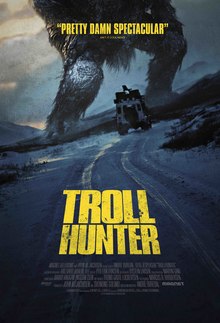The Norse creation myth goes something like this:
In the beginning there was Ymer, who was a gigantic troll of some kind. Ymer had a gigantic goat. For sustenance, the goat licked a gigantic saltstone, and Ymer drank the goat's milk.
When Ymer slept, he was sweating. And what he ended up sweating were the first trolls as
we know them today as the Norse knew them.
He then sweated out the first two Gods.
The gods had a few children - four I think, the first of whom was Odin.
Meanwhile, the goat continued to lick the saltstone, and out of the saltstone the first two humans were formed.
Then Odin and the other born gods came together and they killed Ymer while he slept!
They then took his body and used it to create the whole world! Ymer's blood became the oceans, his torso became the land, and so on.
Meanwhile, the trolls had run away and were hiding in the mountains.
The End - or beginning, if you want.








